Developer Insights
Join millions of viewers! Our engineers craft human-written articles solving real-world problems weekly. Enjoy fresh technical content and numerous interviews featuring modern web advancements with industry leaders and open-source authors.
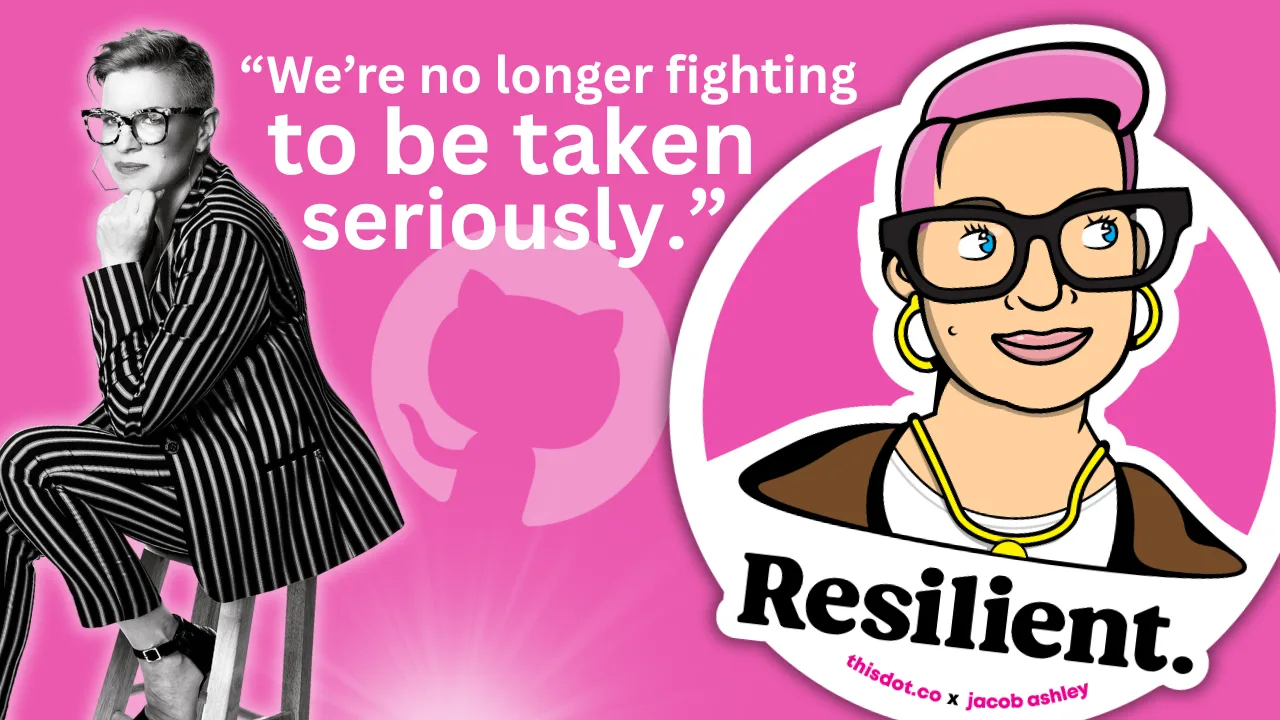
“We were seen as amplifiers, not collaborators,” Ashley Willis, Sr. Director of Developer Relations at GitHub, on How DevRel has Changed, Open Source, and Holding Space as a Leader
Ashley Willis has seen Developer Relations evolve from being on the sidelines of the tech team to having a seat at the strategy table. In her ten years in the space, she’s done more than give great conference talks or build community—she’s helped shape what the DevRel role looks like for software providers. Now as the Senior Director of Developer Relations at GitHub, Ashley is focused on building spaces where developers feel heard, seen, and supported. > “A decade ago, we were seen as amplifiers, not collaborators,” she says. “Now we’re influencing product roadmaps and shaping developer experience end to end.” DevRel Has Changed For Ashley, the biggest shift hasn’t been the work itself—but how it’s understood. > “The work is still outward-facing, but it’s backed by real strategic weight,” she explains. “We’re showing up in research calls and incident reviews, not just keynotes.” That shift matters, but it’s not the finish line. Ashley is still pushing for change when it comes to burnout, representation, and sustainable metrics that go beyond conference ROI. > “We’re no longer fighting to be taken seriously. That’s a win. But there’s more work to do.” Talking Less as a Leader When we asked what the best advice Ashley ever received, she shared an early lesson she received from a mentor: “Your presence should create safety, not pressure.” > “It reframed how I saw my role,” she says. “Not as the one with answers, but the one who holds the space.” Ashley knows what it’s like to be in rooms where it’s hard to speak up. She leads with that memory in mind, and by listening more than talking, normalizing breaks, and creating environments where others can lead too. > “Leadership is emotional labor. It’s not about being in control. It’s about making it safe for others to lead, too.” Scaling More Than Just Tech Having worked inside high-growth companies, Ashley knows firsthand: scaling tech is one thing. Scaling trust is another. > “Tech will break. Roadmaps will shift. But if there’s trust between product and engineering, between company and community—you can adapt.” And she’s learned not to fall for premature optimization. Scale what you have. Don’t over-design for problems you don’t have yet. Free Open Source Isn’t Free There’s one myth Ashley is eager to debunk: that open source is “free.” > “Open source isn’t free labor. It’s labor that’s freely given,” she says. “And it includes more than just code. There’s documentation, moderation, mentoring, emotional care. None of it is effortless.” Open source runs on human energy. And when we treat contributors like an infinite resource, we risk burning them out, and breaking the ecosystem we all rely on. > “We talk a lot about open source as the foundation of innovation. But we rarely talk about sustaining the people who maintain that foundation.” Burnout is Not Admirable Early in her career, Ashley wore burnout like a badge of honor. She doesn’t anymore. > “Burnout doesn’t prove commitment,” she says. “It just dulls your spark.” Now, she treats rest as productive. And she’s learned that clarity is kindness—especially when giving feedback. > “I thought being liked was the same as being kind. It’s not. Kindness is honesty with empathy.” The Most Underrated GitHub Feature? Ashley’s pick: personal instructions in GitHub Copilot. Most users don’t realize they can shape how Copilot writes, like its tone, assumptions, and context awareness. Her own instructions are specific: empathetic, plainspoken, technical without being condescending. For Ashley, that helps reduce cognitive load and makes the tool feel more human. > “Most people skip over this setting. But it’s one of the best ways to make Copilot more useful—and more humane.” Connect with Ashley Willis She has been building better systems for over a decade. Whether it’s shaping Copilot UX, creating safer teams, or speaking truth about the labor behind open source, she’s doing the quiet work that drives sustainable change. Follow Ashley on BlueSky to learn more about her work, her maker projects, and the small things that keep her grounded in a fast-moving industry. Sticker Illustration by Jacob Ashley....
Apr 18, 2025
3 mins
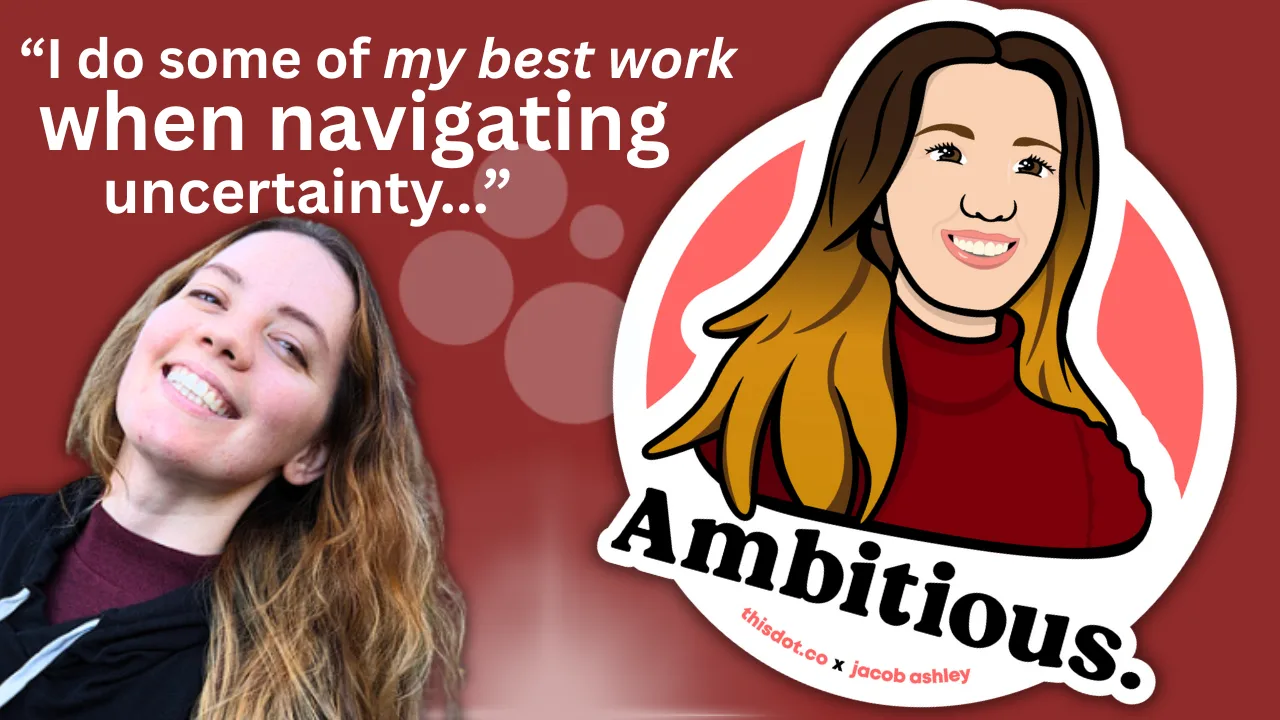
“Recognize leadership behavior early. Sometimes people don’t even realize it in themselves…” Kelly Vaughn on Product Leadership, Creating Pathways for Women in Tech, & Conferences
Some leaders build products. Some lead engineering teams. Kelly Vaughn is doing both. As Director of Engineering at Spot AI—a company building video intelligence software—Kelly recently expanded her role to oversee both Product and Engineering for their VMS offering. That shift means juggling strategy, execution, and team development, all while helping others step confidently into leadership themselves. And yes, she still finds time to speak at conferences and answer DMs from people navigating the same transitions she once did. We spoke with Kelly about spotting leadership potential early, why ambiguity doesn’t have to feel chaotic, and the lesson she learned the hard way about managing up. Stepping into Product Leadership Kelly’s new title might look like a promotion on paper, but the shift is more philosophical than anything. > “Engineering leadership is about execution,” she says. “Product leadership is about defining why we’re building something in the first place.” Now leading Product and Engineering for Spot AI’s VMS product, she’s talking to customers, researching market trends, and making smart bets on where to invest next. It’s a role she’s clearly energized by. > “I’m really looking forward to dedicating time to shaping our product’s future.” Thriving in Ambiguity Some people panic when problems are fuzzy or undefined. Others use it as fuel. > “There are two key traits I see in people who handle ambiguity well,” Kelly says. “They stay calm under stress, and they know how to form a hypothesis from a vague problem statement.” That means asking the right questions, taking action quickly, and being totally okay with pivoting when something doesn’t pan out. It’s no surprise that these same traits overlap with great product thinking—a mindset she’s now leaning into more than ever. > “I do some of my best work when navigating uncertainty,” she adds. Read Kelly’s blog on embracing ambiguity in Product! Creating Leadership Pathways for Women in Tech When asked how leaders can create more leadership pathways for women in software engineering, Kelly stressed that it is not a passive process. > “Senior leaders need to be proactive,” Kelly says. “That starts with identifying and addressing bias across hiring, promotions, and day-to-day interactions.” She emphasizes psychological safety—so women feel confident advocating for themselves and others. But she also knows not everyone feels ready to raise their hand. > “Don’t wait for someone to ask for a title change or a growth opportunity. Recognize leadership behavior early. Sometimes people don’t even realize it in themselves yet.” On Stage, In Real Life Kelly’s no stranger to the tech conference circuit—often giving talks on engineering leadership and team growth. Her biggest source of inspiration? Conversations with people trying to make the leap into leadership. > “I might use the same slide deck at three conferences,” she says, “but the talk itself will be different every time.” Rather than sticking to a script, she likes to share recent examples from her own work, tailoring the delivery to the audience in front of her. It keeps things relevant, grounded, and never too polished. Between setting product strategy, mentoring the next generation of leaders, and hopping from one tech conference to the next, Kelly Vaughn is showing what it means to lead with clarity—even when things are unclear. She’s not here to tell you it’s easy. But she will tell you it’s worth it. Connect with Kelly Vaughn on Bluesky. Sign up for Kelly Vaughn’s Newsletter! Sticker Illustration by Jacob Ashley....
Apr 4, 2025
3 mins

“ChatGPT knows me pretty well… but it drew me as a white man with a man bun.” – Angie Jones on AI Bias, DevRel, and Block’s new open source AI agent “goose”
Angie Jones, VP of Developer Relations at Block, champions developer advocacy, AI ethics, and leadership. She’s leading discussions on AI governance, bias in career tools, and *goose*, an open-source AI assistant for developers....
Mar 13, 2025
4 mins

Psychologically Safe Workplaces with Krystal Smith-Moore
Krystal Smith-Moore, Engineering Manager at Spotify, shares her journey from a non-traditional background to management, and how it informs her empathetic leadership approach. Krystal emphasizes the significance of self-awareness, seeking support, and aligning personal values with management roles. By ensuring our values align with the company's mission and culture, we can create a more fulfilling leadership experience. Krystal stresses the need for self-care, setting boundaries to prevent burnout, and recognizing when it's time to recharge. By prioritizing self-care, leaders can maintain their energy and enthusiasm, leading to better decision-making and a more positive work environment. She also discusses the importance of empathy, continuous learning, and creating psychologically safe workplaces where employees feel comfortable expressing their ideas and concerns. By aligning personal values with management roles, prioritizing self-care, and fostering a psychologically safe workplace, leaders can create a positive and impactful experience for themselves and their teams. Download this episode here....
Jun 13, 2024
1 min

How to be an Effective Technology Leader in an Agile Startup Environment with Daniel Chopson
Daniel Chopson, CTO and co-founder of Cove Tool, discusses key aspects of engineering leadership, team management, and software development in the fast paced startup environment. Cove.Tool, initially a sustainability-focused software company, has evolved to offer AI-driven solutions for architects and engineers. Daniel shared valuable insights on the importance of productive retrospectives, agile planning, and strategic team structuring. Daniel emphasized the significance of conducting productive retrospectives to foster team improvement and effective communication. By celebrating wins and establishing clear action items, teams can identify areas for growth and implement necessary changes. These retrospectives provide a platform for open and honest discussions, enabling teams to learn from their successes and failures. Encouraging a culture of continuous improvement allows engineering leaders to drive innovation and enhance team collaboration. In a startup environment, balancing planning and agility is crucial for success. Cove.Tool prioritizes shorter-term sprint planning to allow for real-time feedback and adaptability. By aligning work towards business objectives while maintaining flexibility in planning, the team can respond quickly to changing market demands. This approach enables Cove.Tool to stay ahead of the curve and deliver high-quality solutions to their clients. The key lies in finding the right balance between long-term strategic planning and the ability to pivot when necessary. Team structuring plays a vital role in engineering leadership. Daniel highlighted the importance of specialized roles like engineering managers and tech leads for effective people development and technical guidance. Engineering managers focus on nurturing the growth and well-being of team members, while tech leads provide technical expertise and mentorship. This division of responsibilities ensures that both the personal and technical aspects of team development are adequately addressed, leading to a more productive and motivated workforce. The conversation underscored the significance of adaptability, feedback-driven decision-making, and strategic team structuring in successful software development endeavors. By embracing change and continuously seeking feedback, engineering leaders can make informed decisions and drive innovation. Strategic team structuring, with specialized roles and clear responsibilities, ensures that the right people are in the right positions to maximize productivity and foster growth. Effective engineering leadership is essential for adapting to changing market demands and building teams equipped to tackle future challenges. Download this episode here....
May 24, 2024
2 mins
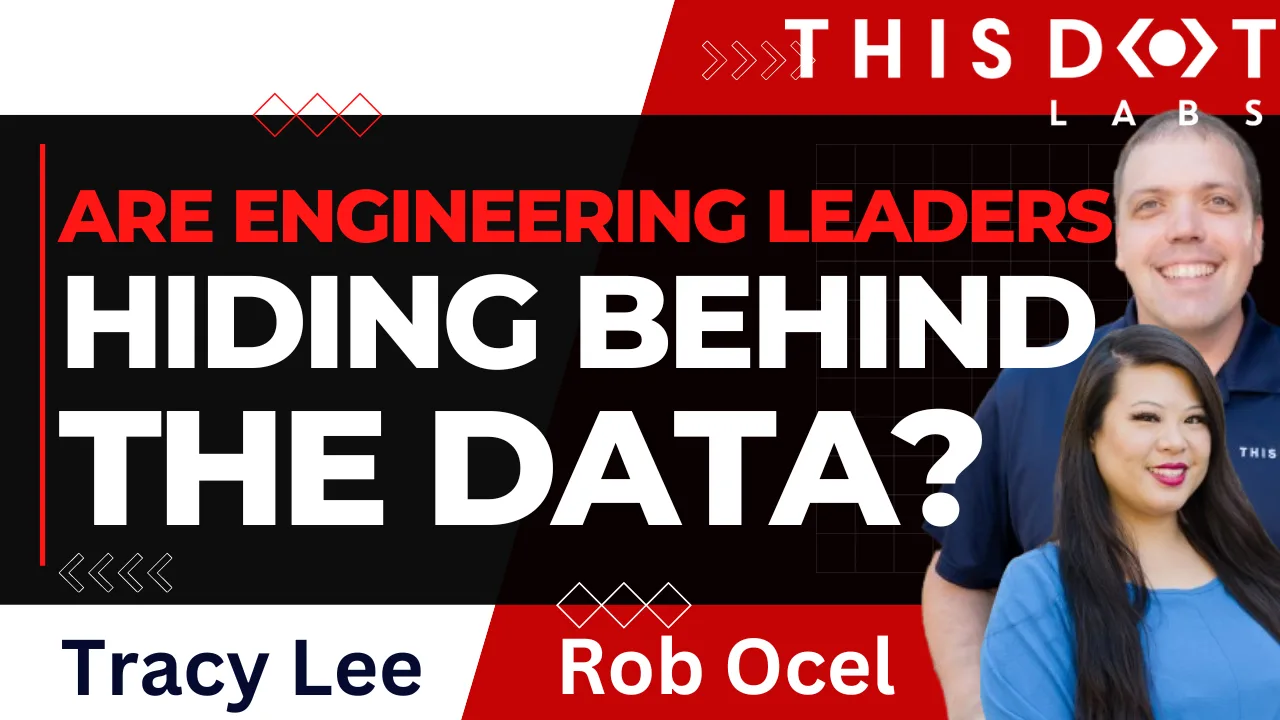
Are Engineering Leaders Hiding Behind the Data?
Many engineering leaders when they start out find themselves just wanting to please everyone around them. Figuring out how to “own” the role is quite difficult for many. Rob Ocel, Engineering Lead and Tracy Lee, CEO at This Dot explore this topic on this episode. They discuss the idea of hiding behind the data. When decisions are made, it’s easy to ask for data, but then make decisions solely based on that data and not form or “own” an opinion around that decision so you can’t get blamed for an opinion you had. Rob encourages leaders to have opinions and be willing to fight for them. Another topic covered was making people unhappy in a deliberate way. Are you able to succeed doing so, and do you have the ability to “own” that? Rob also emphasizes the need for self-awareness and self-introspection, and to have mentors and accountability partners to help guide decision-making. Listen to the full podcast here: https://engineeringleadership.podbean.com/e/are-engineering-leaders-hiding-behind-the-data-with-robocel-tracy-lee/...
Jan 24, 2024
1 min
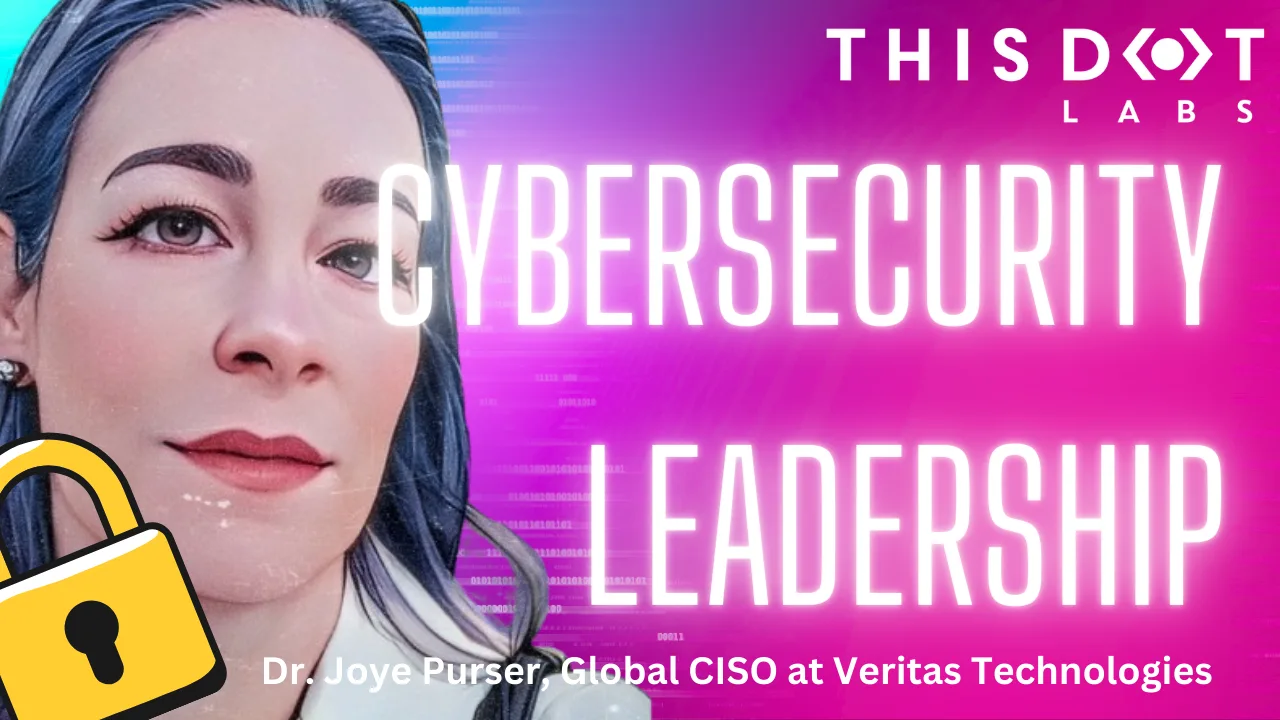
Cybersecurity Leadership 101 with Dr. Joye Purser
Dr. Joye Purser is the field Chief Information Security Officer (CISO) at Veritas, a software company specializing in data backup systems. Veritas' global leadership in cybersecurity plays a critical role in data backup and restoration in the cybersecurity landscape. Dr. Purser's career ranges from her time at the Cybersecurity and Infrastructure Security Agency (CISA) for the U.S. Department of Homeland Security to roles at the Pentagon and the White House. Dr. Purser talks about common misconceptions regarding working in the government in the field of technology and notes the increasing trend of tech companies recruiting individuals with defense and military backgrounds due to rising threats to the private sector. There is an evolution in cybersecurity, particularly post-pandemic, with an increased sophistication of cyber threats and a rise of ransomware attacks. There is now a heightened focus on critical infrastructure security and a new outlook on the potential life-threatening consequences of cyber disruptions. The qualities of effective cybersecurity leadership are vision, adaptability, and emotional intelligence. Dr. Purser elaborates on the importance of having a clear vision, especially in an emerging role like hers at Veritas. She shares her experience obtaining the Certified Information System Security Professional (CISSP) certification, highlighting the necessity of adaptability in acquiring new skills and staying ahead of the rapidly changing cybersecurity landscape. Dr. Purser stresses the significance of soft influencing skills, adaptability in communication styles based on the audience, and the ability to read the room. She emphasizes the need for emotional intelligence when asking for resources or driving change, recognizing the discomfort associated with these demands. Listen to the podcast here: https://engineeringleadership.podbean.com/e/joye-purser/...
Jan 16, 2024
2 mins
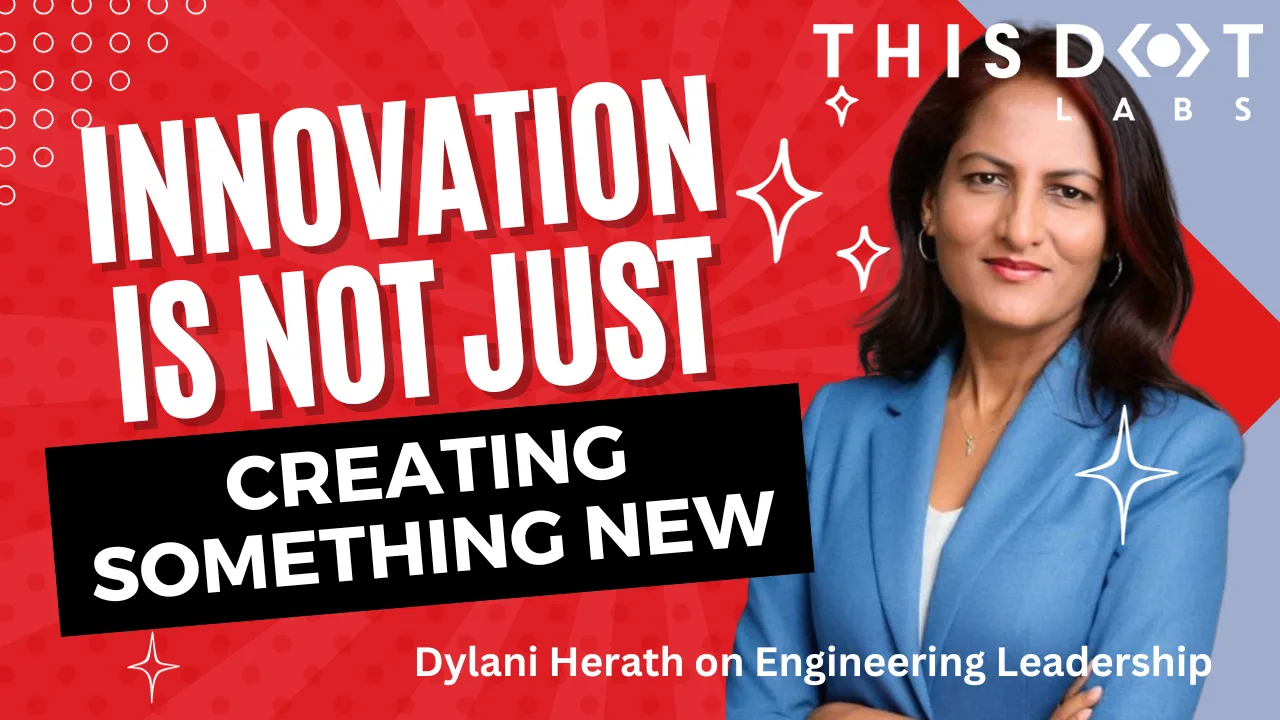
Innovation is NOT Just Creating Something New: Dylani Herath, FinTech Leader
Dylani Herath, a well known FinTech leader who has worked at organizations such as Greenwood, JP Morgan, and FIS sat down with Rob Ocel, Engineering Lead at This Dot Labs and shared some insight on how digital leaders can improve culture and lead...
Jan 10, 2024
3 mins
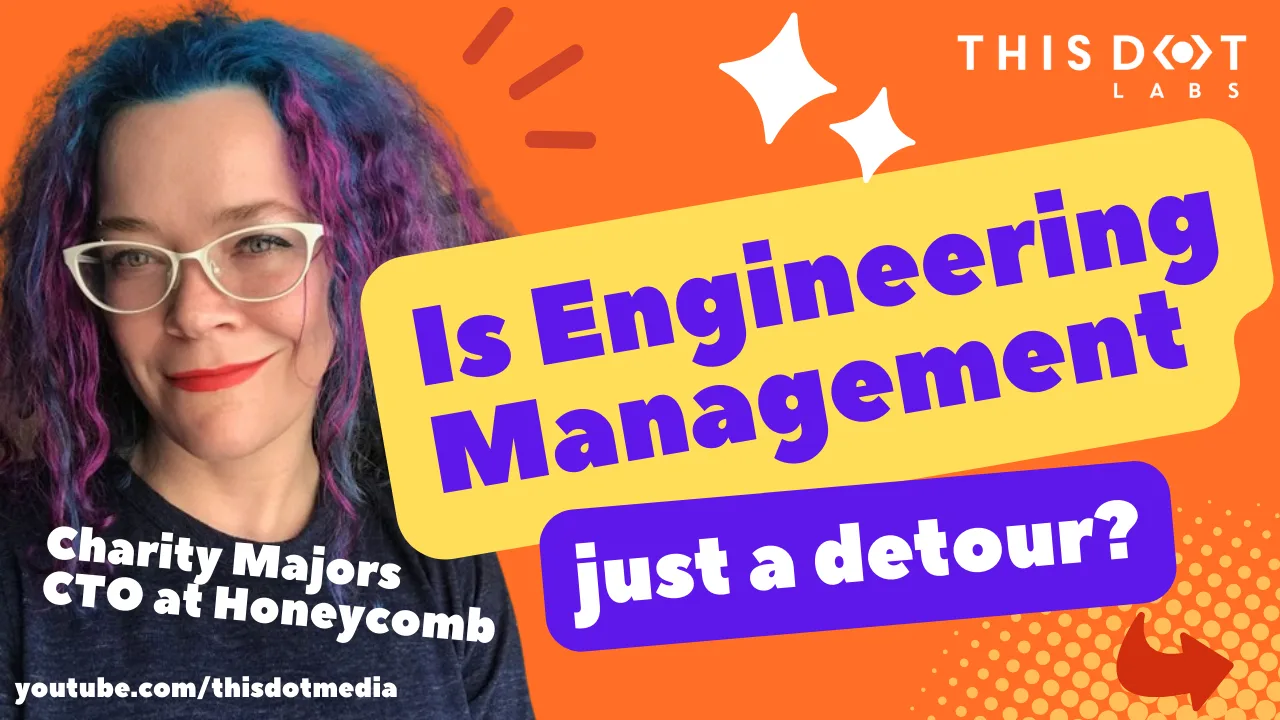
Engineering Management: Just a Detour? - Charity Majors, CTO at Honeycomb
Rob Ocel interviews Charity Majors, CTO at Honeycomb on engineering leadership. Engineering management was once thought of as an inevitable destination for engineers who sought advancement in their careers, but now engineers have more options than ever. Many engineering managers are becoming engineers again, and the role of manager requires a significant amount of emotional labor. Should anyone want to be an engineering manager? Charity shares her journey of becoming an accidental CTO and founder, despite never aspiring to be a manager. She talks about the importance of engineering managers, and how they help teams outperform those without one, but acknowledges the role is challenging and not always enjoyable. Charity and Rob discuss how good managers can transform a company. They are compared to the nervous system of a company, routing information and ensuring everyone has what they need to succeed. Charity highlights the difficulty engineers face when transitioning from a ticket system to a more autonomous work environment. This shift can be challenging, as engineers may struggle with the newfound freedom and responsibility. It can take years to fully make the transition, so leaders looking to promote engineers to management need to be committed to and patient with the transition. Both Charity and Rob agree that a strong social support system for engineering managers is necessary as the role can be isolating, and having a network of peers who understand the challenges can be invaluable. Charity Majors' experiences and perspectives shed light on the challenges and rewards of the role, and when engineers should and should not pursue this career path....
Jan 4, 2024
2 mins
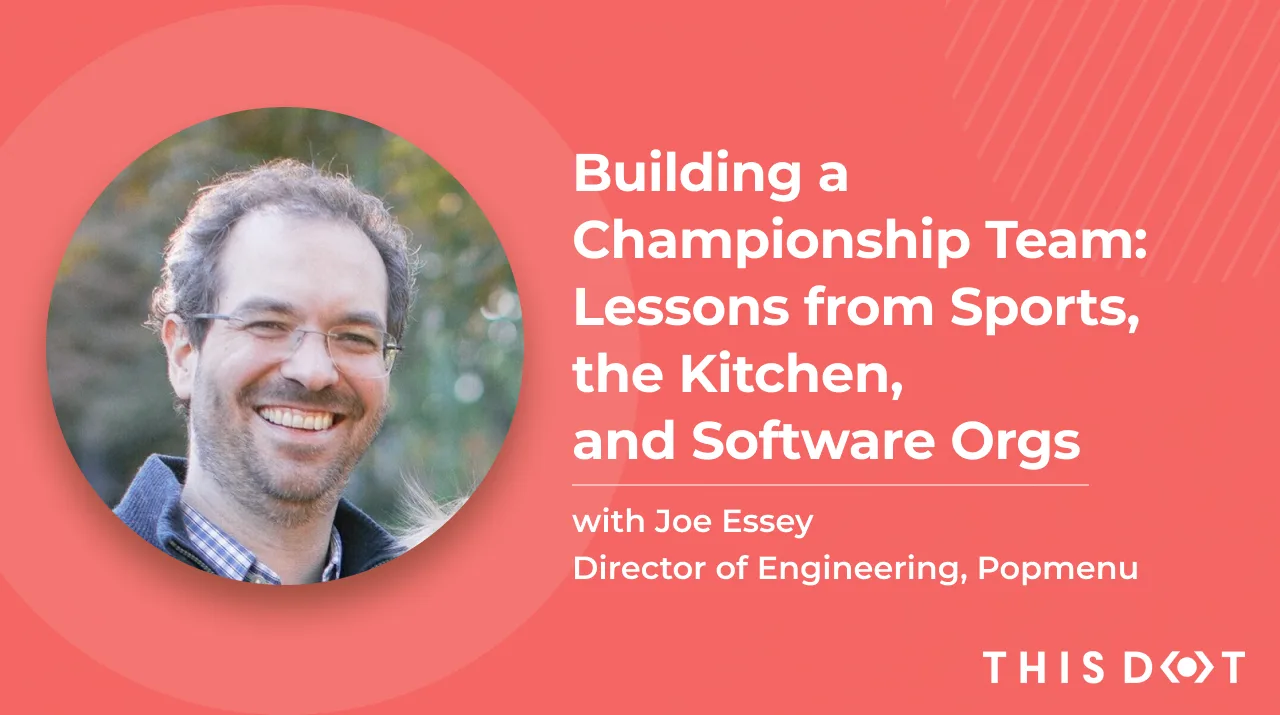
Building a Championship Team: Lessons from Sports, the Kitchen, and Software Orgs with Joe Essey, Director of Engineering at Popmenu
In this episode of the Engineering Leadership podcast, Rob Ocel sits down with Joe Essey, the Director of Engineering at Popmenu, to discuss the key elements of creating a high-performing team environment. Drawing from his experience in the restaurant...
Dec 19, 2023
2 mins

From Vision to Results Quickly with Rapid Prototyping: Insights from Salesforce CTO Charlie Isaacs
In this episode of the Engineering Leadership series, Rob Ocel interviews Charlie Isaacs, the CTO for Customer Connection at Salesforce. Charlie describes his career journey - from Government contracting to being at the front of major tech trends such as IoT and AI at Silicon Valley startups to becoming the CTO for Customer Connection at Salesforce. He shares some key lessons he learned in his career about rapid prototyping and daring to dream big. One of Charlie's key strategies is understanding the values and true goals of his team and his clients. He delves into a customer's annual report and familiarizes himself with the individuals present in the room. This preparation allows him to tailor his demos to align with the customer's vision. Charlie also employs a technique he calls "spaghetti flinging," where he throws out ideas and observes which ones stick. This approach fosters innovation and encourages creative problem-solving. Charlie emphasizes the significance of digital transformation in maintaining competitiveness in today's economic climate. He suggests that companies should strive for operational efficiency, and Salesforce is actively leveraging their own tools and implementing automation to achieve this goal. By streamlining their operations, Salesforce aims to enhance their overall performance and deliver better customer experiences. Charlie also talks about the power of rapid prototyping. Leaders are distracted by their day to day operations, they often cannot conceive that something can be built rapidly to prove an idea and provide data. Rapid prototyping allows leaders to divide and conquer, by breaking up a large vision into smaller ideas that can be quickly built and evaluated. Charlie advocates that these prototypes are not play versions of real solutions, but instead true MVP versions that deliver real value at a smaller scale. Charlie Isaacs, the CTO for Customer Connection at Salesforce, shares insights into his role and strategies in this episode. Through thorough research and tailored demos, he connects customers to Salesforce's products and services. He emphasizes the importance of innovation and digital transformation in staying competitive. Charlie’s story highlights the value of having grand vision but rapidly turning vision into action....
Dec 12, 2023
2 mins

Being a CTO at Any Level: A Discussion with Kathy Keating, Co-Founder of CTO Levels
In this episode of the engineering leadership series, Kathy Keating, co-founder of CTO Levels and CTO Advisor, shares her insights on the role of a CTO and the challenges they face. She begins by discussing her own journey as a technologist and her experience in technology leadership roles, including founding companies and having a recent exit. According to Kathy, the primary responsibility of a CTO is to deliver the technology that aligns with the company's business needs. However, she highlights a concerning statistic that 50% of CTOs have a tenure of less than two years, often due to a lack of understanding and mismatched expectations. She emphasizes the importance of building trust quickly in order to succeed in this role. One of the main challenges CTOs face is transitioning from being a technologist to a leader. Kathy stresses the significance of developing effective communication habits to bridge this gap. She suggests that CTOs create a playbook of best practices to enhance their communication skills and join communities of other CTOs to learn from their experiences. Matching the right CTO to the stage of a company is another crucial aspect discussed in the episode. Kathy explains that different stages of a company require different types of CTOs, and it is essential to find the right fit. To navigate these challenges, Kathy advises CTOs to build a support system of advisors and coaches who can provide guidance and help them overcome obstacles. Additionally, she encourages CTOs to be aware of their own preferences and strengths, as self-awareness can greatly contribute to their success. In conclusion, this podcast episode sheds light on the technical aspects of being a CTO and the challenges they face. Kathy Keating's insights provide valuable guidance for CTOs to build trust, develop effective communication habits, match their skills to the company's stage, and create a support system for their professional growth. By understanding these key technical aspects, CTOs can enhance their leadership skills and contribute to the success of their organizations....
Dec 5, 2023
2 mins
Let's innovate together!
We're ready to be your trusted technical partners in your digital innovation journey.
Whether it's modernization or custom software solutions, our team of experts can guide you through best practices and how to build scalable, performant software that lasts.